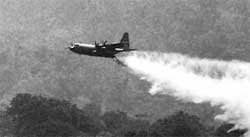Return of the smog
Return of the smog

the threat of renewed Indonesian fires looms large over Southeast Asia. Experts have warned that if the fires continue to gain a strong foothold in Indonesia, Kalimantan and Sumatra, then Brunei, Malaysia, Singapore, Southern Thailand and the Philippines could see a repeat of the smog that blotted out the sun for days last year.
Indonesian officials say that satellite photographs indicate more than 90 "hot spot' areas that are affected by new or resurgent fires in parts of Kalimantan and Borneo. The fires may aggravate the economic crisis in Indonesia and could lead to serious social unrest. The warning given by experts may act as a blow for a region already battered by a currency and banking crisis.
Indonesian environmentalists blame plantation companies - many with close connections to the government - for starting most of the fires as it is the cheapest and the quickest way of clearing forest and scrub land for commercial development.
"We could certainly be in for a repeat of last year if the fires keep burning," says Steve Tamplin, regional adviser on environmental health for the World Health Organisation office in Manila. "Last year, the fire-fighters couldn't do very much to contain the fires once they got started," he says.
The uncontrolled fires are blazing at present in East Kalimantan Province on the island of Borneo, where vast dried-out peat and coal seams close to the surface. Once they catch fire, they are difficult to put out. They also release toxic sulphur and nitrogen pollutants into the atmosphere along with heavy smoke. Soetarso, a senior official at the Co-ordinating Board for National Disaster Management in Jakarta says that the Indonesian government hoped that the fires would not spread smoke to other countries. " We might not have the money to fight the fire because of our economic problems," he added.
Such comments and the apparent inability of Indonesian authorities to control the fires are causing concern in neighbouring countries which have to bear the consequences. Malaysia is especially worried because it will be host to the Commonwealth Games in September - the month in which the smog was at its peak in 1997. Malaysian leaders fear that a recurrence of the smoke this year from the Indonesian fires which traps transport and industrial fumes to create noxious smog, will deter athletes from competing. Yeo Cheow Tong, environment and health minister of Singapore said recently that the government was keeping a close watch on the situation to alert the Indonesian authorities of the new fires using satellite pictures. Malaysia, Singapore and Indonesia had agreed on a joint action plan in December to prevent a recurrence of smoke pollution, under which Jakarta agreed to improve its firefighting capabilities.







